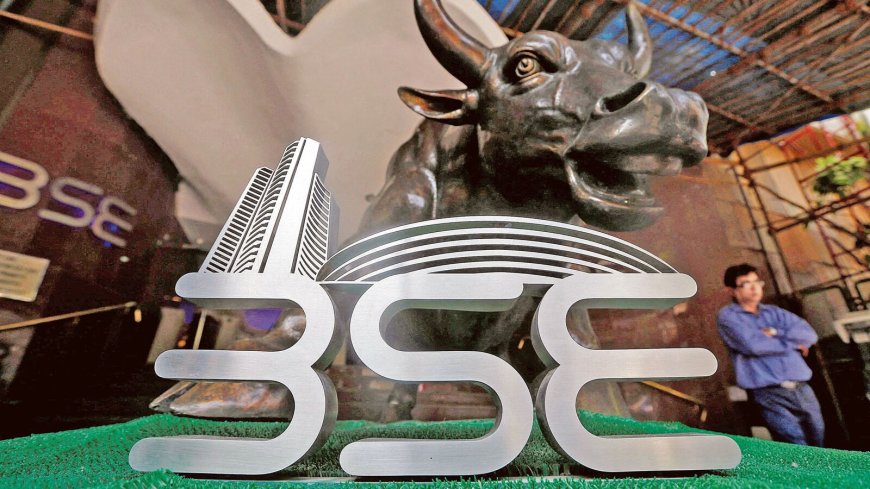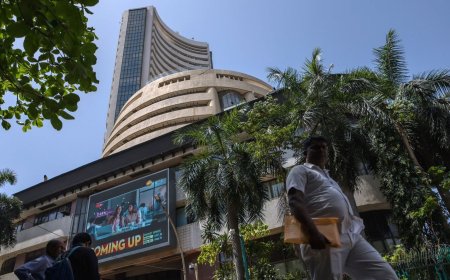BSE share price tanks 4%, extends weekly fall to 10% amid Sebi-Jane Street saga. More pain ahead?
BSE share price slips 4%, extending weekly fall to 10% amid SEBI’s probe into Jane Street’s trades. Analysts warn of more downside. Find out what’s next for BSE investors.

Shares of BSE Ltd. (formerly Bombay Stock Exchange) witnessed a sharp decline of nearly 4% on Thursday, continuing their downward spiral for the week. The stock has now corrected almost 10% in the last five trading sessions, as investor sentiment turned sour following regulatory heat and high-profile scrutiny over alleged options trading irregularities involving global trading firm Jane Street.
The ongoing investigation by the Securities and Exchange Board of India (SEBI) has raised serious questions about the robustness of regulatory systems and the possible role of exchanges in oversight lapses. As a result, BSE's market capitalization has eroded by over ₹2,500 crore in just a week.
Sebi’s Investigation Sends Shockwaves
The trigger for the steep correction lies in the SEBI-Jane Street controversy, where the regulator is probing the alleged misuse of illiquid options and preferential access to trading data. While Jane Street, a well-known global quantitative trading firm, has pushed back against the charges, claiming compliance with Indian regulations, SEBI has remained firm on its stance.
According to reports, SEBI suspects that certain trades executed by Jane Street through the BSE platform may have violated fair access principles, leading to market distortion. This comes in the backdrop of increased scrutiny on the governance of Indian exchanges, especially in light of previous controversies involving NSE’s co-location case.
BSE has denied any wrongdoing but has admitted that it is cooperating fully with the investigation. However, the regulatory overhang has clearly rattled investors.
Share Price Performance and Technical Levels
BSE stock opened Thursday’s session on a weak note and quickly plunged to an intraday low of ₹2,965 on the NSE, before closing at ₹2,984 — down 3.9% for the day. The stock has now broken below the critical ₹3,000 psychological support level, which analysts view as a bearish sign.
“This persistent weakness is indicative of deep investor discomfort. Technically, the stock is in a downtrend with a potential to test ₹2,800 if sentiment doesn’t improve,” said Avinash Gorakshakar, Director at Profitmart Securities.
On a year-to-date basis, the stock is still up around 28%, thanks to a stellar rally in the first half of 2025 driven by record transaction volumes and improved profitability in BSE’s equity and derivatives segments.
Market Context: Regulatory Risk Repricing
The Indian stock market has been enjoying robust domestic participation and increased FII flows post-elections. However, regulatory uncertainties—especially around market infrastructure institutions (MIIs) like exchanges and clearing corporations—are being repriced aggressively.
“Investors are becoming more discerning with companies that are exposed to regulatory oversight. Exchanges like BSE and NSE are no longer seen as bulletproof. Any perception of bias or access irregularities hits hard,” noted Mehul Desai, an independent market analyst.
The current episode has come at a time when SEBI is already pushing for stricter compliance and better transparency among MIIs. The regulator recently proposed enhanced disclosure norms for exchange boards and increased third-party audits, in a bid to shore up investor confidence.
BSE’s Financials Still Strong
Despite the controversy, BSE’s financial health remains sound. For the March 2025 quarter, the company reported a consolidated net profit of ₹122 crore, up 42% year-on-year, on the back of rising revenues from equity and derivatives turnover. The average daily turnover in equity derivatives surged nearly 90% YoY, underscoring strong retail participation.
However, some analysts warn that such numbers could be impacted in the upcoming quarters if trading volumes shift to rival exchanges amid reputational concerns.
“Reputational risk has a direct impact on trading activity and investor trust. If BSE loses high-frequency or institutional clients, we could see a drop in revenue,” said Ankit Agarwal, Research Analyst at Motilal Oswal Financial Services.
Outlook: Is the Worst Over?
While the stock has corrected sharply, several experts believe the worst may not be over yet. Regulatory developments, potential penalties, or prolonged investigations could continue to weigh on the stock.
Short-term investors are advised caution.
“From a valuation standpoint, BSE is still not in bargain territory. If regulatory headlines persist, a further 5-7% correction cannot be ruled out,” said Vinit Bolinjkar, Head of Research at Ventura Securities.
However, long-term investors who believe in the structural growth of Indian capital markets may see this as an opportunity to accumulate gradually, provided there is clarity from SEBI in the coming weeks.
The SEBI-Jane Street episode has opened a new chapter of scrutiny for India’s financial markets, and BSE appears to be caught in the eye of the storm. While the fundamentals of the company remain intact for now, the regulatory uncertainty and damage to investor confidence have dented the stock’s near-term outlook.
As the investigation unfolds, investors will watch closely for official clarifications, possible regulatory outcomes, and steps taken by BSE to restore transparency and trust. Until then, the pressure on BSE shares is likely to persist.
What's Your Reaction?
 Like
0
Like
0
 Dislike
0
Dislike
0
 Love
0
Love
0
 Funny
0
Funny
0
 Angry
0
Angry
0
 Sad
0
Sad
0
 Wow
0
Wow
0













































































